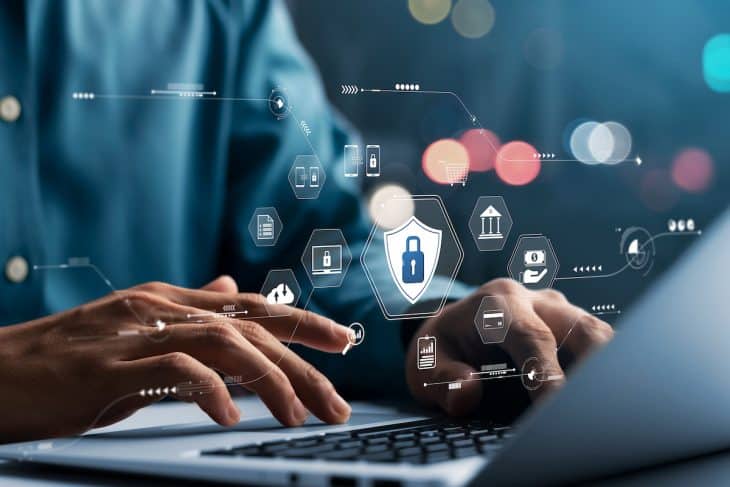
As more and more businesses experience security breaches, it is more crucial than ever to practice safe, secure, and private online activities. It is important to remember that there is always some risk when doing anything online, including banking, shopping, communicating, etc.
We all have certain things we won’t tell other people about or let them see. The best way to safeguard one’s privacy is to figure out what information needs to be hidden and from whom. If we don’t want our photos to be seen by the public, we can restrict access to our accounts. Alternatively, we can encrypt our data to prevent malicious servers from accessing our sensitive information.
Data Privacy Statistics, Facts, and Trends
- According to a report by DataProt, the total damage in 2022 in terms of monetary value is around $6 trillion.
- The report by DataProt also states that a cyberattack happens every 39 seconds, and ransomware happens every 14 seconds.
- Google tracks 40% of the web traffic as per the report by WhoTracks.Me.
- Only 47% of the 82% of people who use social media believe they trust the ability of online businesses and social media to keep their personal information private. Out of this 47% of social media users, 9% have no trust in social media.
- 41% of users make unique passwords for each site because they don’t trust online services or social media.
- According to a study by Pew Research Center, roughly 79% of Americans worry about the privacy of their personal information being sold or shared by companies.
- Around 93% of Americans believe it is essential to have complete control over their data. At the same time, 9% of these people believe they have “a lot of control” over the data that companies are collecting from them.
- Almost 107 countries have prepared legal frameworks for data collection and ensuring users’ privacy.
- According to CyberCrime Magazine, the spending on cybersecurity worldwide was above $1 trillion in 2021.
- Microsoft spends around $1 billion each year on its cybersecurity. (Reuters)
- Phishing accounts for more than 90% of successful attacks against businesses.
- According to the report by Cisco, about a third of customers have cut ties with a company because of data concerns. They stopped using various forms of social media, internet service providers, merchants, credit card firms, and financial institutions.
- According to data collected and analyzed by the cyber security industry, DDoS attacks are more prevalent than ever before. In fact, attacks utilizing between 100 and 400 Gbps of data grew by 776% in just one year. Common victims of these types of attacks are those in the satellite and wireless communication industries.
- Businesses in the US are least likely to pay ransom amounts to hackers. Only 3% of US businesses gave hackers the money they demanded in a ransom. However, Canada and UK are likely to pay ransom 77% and 42% of the time.

Data Privacy and Protection Regulation Statistics
- According to reports by the UN, data protection and privacy laws are presently in effect in 69% of the world’s countries.
- So far, at least 20 countries (not including EU members) have passed legislation similar to the General Data Protection Regulation (GDPR). This includes all seven of the world’s continents.
- According to a report published by Persona, after the General Data Protection Regulation went into effect, 62% of British citizens felt safer giving out their personal information.
- The largest penalty under GDPR was $877 million in July 2021.
Social Media and Data Privacy
Other than websites, social media platforms have access to a vast amount of personal information. Users are eager to provide information such as their age, gender, location, and occupation when creating a profile. They are also continuously tracked through their actions such as likes, posts, comments, friend requests, and followers.
Cyberattacks have affected 21% of people who use the internet for email and social media. Not only that, social media platforms gather users’ information and sell them to advertisers to create cohorts and customize their advertising strategies according to users’ profiles.
Many social media platforms have been rushing to revise their privacy policies in the wake of the Cambridge Analytica controversy. They’re doing this because it’s in their best interest to maintain users’ trust in them and the data they provide.
However, governments do not always trust private enterprises to police themselves successfully. As a result, numerous countries have lately introduced legislation rules governing how businesses are to handle sensitive customer information in the future, like:
- GDPR: General Data Protection Regulation
- CPRA: California Privacy Rights Act
- CDPA: Consumer Data Protection Act
- CPPA: Canada’s Consumer Privacy Protection Act

How Can You Protect Your Data?
There are many ways you can ensure that your data is safe and your online privacy stays intact. Read on to find out some of the significant steps you can take to protect your data online.
Use a VPN
A VPN is an excellent tool for hiding your internet activity from prying eyes. When you use a VPN, all your data travels through encrypted tunnels and is stored on the network’s private servers, protecting it from prying eyes.
When you connect to a VPN server, the server’s IP address replaces your actual IP address. You appear as though you are not actually where you are. Due to the masking of your IP address and domain name server, neither your ISP nor any other third parties can track your online movements.
VPNs encrypt all traffic and mask the user’s location to prevent hackers from stealing personal information and Distributed Denial of Service attacks (DDoS). It also bypasses censorship of content that may be blocked in your jurisdiction. Thus, you may access any website or app from any location.
Private Browsing
Do note that Google and Bing record your online activities and create a profile based on your searches. When Google has enough information about you from using their services and other websites, they can serve advertising tailored to you within their apps and other sites. If you value your privacy, it’s best to stick with a search engine that doesn’t track your every move.
Use Safe and Secure Communication Apps
Given how frequently we use messaging apps to disclose sensitive information, it is crucial that all online discussions are fully encrypted. Because of concerns about their privacy and the security of personal information, more consumers are switching to encrypted messaging services.
For instance, Meta-owned apps gather data from your phone and Facebook account. You can find these privacy policies in their terms of service. Indeed, this is a serious issue that calls for prompt action.
Use an Antivirus Program
Antivirus software performs invisible checks in the background to protect your privacy and keep your work uninterrupted. Without an antivirus program, you have little hope of preventing malicious software from infecting your system. It’s crucial to have this kind of safeguard installed on your device in order to protect your personal information and identity.
Was this page helpful?
Our commitment to delivering trustworthy and engaging content is at the heart of what we do. Each fact on our site is contributed by real users like you, bringing a wealth of diverse insights and information. To ensure the highest standards of accuracy and reliability, our dedicated editors meticulously review each submission. This process guarantees that the facts we share are not only fascinating but also credible. Trust in our commitment to quality and authenticity as you explore and learn with us.


